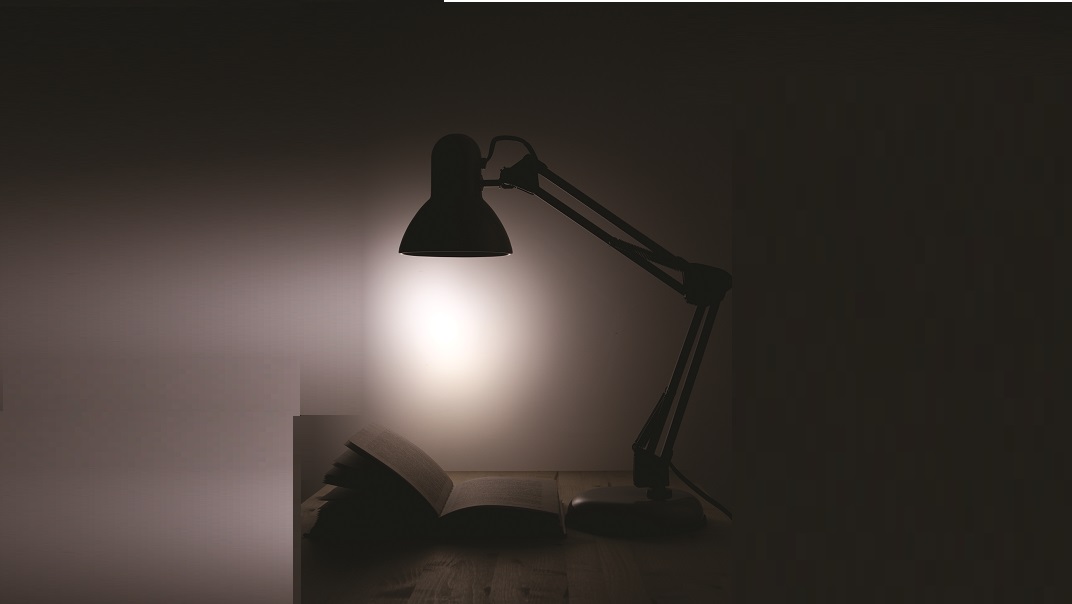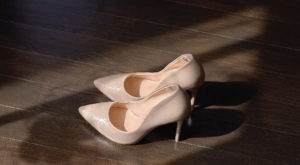Night Light
| October 13, 2016“Do you have any idea what it’s like to be married for just two months and have your mother show up at your door in tight pants, with her hair tumbling down her shoulders?”

"If the world is only 5777 years old how come scientists find fossils that are hundreds of thousands of years old?”
The silence after I ask what I think is a reasonable question in Navi is a heartbeat too long. Miss Litwin recovers her composure soon enough. “I doubt this is a question that bothers most of the class Leah,” she says “so why don’t we talk after class?” Miss Litwin goes right back to the Metzudos she was dissecting.
After class I drag myself to Miss Litwin’s desk. She motions for me to sit down. “It’s interesting that your question focused on age of the universe,” she says. “I would have thought your philosophical grappling would be about tzaddik v’rah lo. Or maybe a question about how a benevolent G-d could allow the Holocaust to happen which is an outgrowth of the same question. Something that would get to the core of fairness and justice.” How dare she make all these assumptions?
“Nope,” I say forcing my voice to sound breezy. “Just fossils bother me. I mean aren’t there remains dated at nearly 200,000 years old?”
Miss Litwin stares at me a gaze that seems to look right through me. “Is that what’s really bothering you?” she asks softly. She leans towards me. “The principal told me what’s going on at home. You must be feeling very confused right now.”
I glare at her long and hard. She ignores the look and plows on. “Do you still see your mother regularly? Do you discuss…” she trails off. I guess her continued enrichment classes for the dedicated mechaneches don’t have a module on “How to Talk to a Student whose Mother Went off the Derech.” I’m not about to help her out. I look down at my feet. The gold buckle is falling off the right shoe.
Miss Litwin tries again. “I’m sure you’re confused. But it’s important that you don’t spread this confusion to other girls. You’re welcome to ask me whatever you want after class. Would you like to discuss fossils or is there something else you want to ask?”
“Forget it, forget the fossils,” I say. “Everything is just fine. Can I go now?”
Another X-ray look. Then a slight nod. I stand up and run. I feel her eyes follow me down the hall. I stare at the floor. The buckle on my right shoe is gone. Great, just great.
***
Gila is home when I let myself in, and I’m so glad someone’s in the house that I nearly forget how mad I am at her.
“Hey there,” I say. “I see you finally remembered that you have a family in addition to a husband.”
“And hello to you, too,” she says. “No need to be nasty the minute you walk in the door.”
“I wasn’t—” Oh, what’s the point? “Nice to see a human here at this hour. You staying for supper?”
“Nah, I have to get back before Yossi gets home. I came to pick up some sweaters.”
I notice the wheelie at the door and my heart sinks. Everyone has fled. Gila has Yossi, Shimon is in Eretz Yisrael, and even Moishy managed to escape to some out-of-town yeshivah his rebbi hastily arranged for him after Mommy walked out.
“You coming for Shabbos?” I ask Gila, trying to keep the desperation from my voice.
“No!”
I open the fridge, pour myself a cup of juice, then look Gila in the eye. “Mommy may not be here, but Tatty is. Did it ever dawn on you what Shabbos must be like for him?” My voice drops, and my next words come out in a whisper: “What it’s like for me?”
Gila’s face softens. “Look, Leah, I feel bad. Really. I know Shabbos is hard for both of you. But I’m in shanah rishonah. Do you have any idea what it’s like to be married for just two months and have your mother show up at your door in tight pants, with her hair tumbling down her shoulders? Yossi is a great guy, but this is not what he signed up for. I can’t make things any worse.”
“Well, at least you’re married,” I tell her. “Can you imagine what my shidduch résumé will look like? Father: burnt-out accountant, who spends his spare time in the beis midrash to escape his empty home, Mother: aspiring textile designer putting herself through college by making cold calls for a political pollster, possibly bipolar, definitely not frum. The shadchanim will be running after me.”
“You’ve got some time before you need to worry about it,” Gila says after a long pause. “Just hope things don’t get any worse by then.”
“Thanks, sis, you always know how to cheer me up.”
She slips her fingers into the handle of her wheelie. “Gotta run, Yossi will be home in half an hour and I still didn’t cut up a salad. Hang in there.”
And with a little wave, she’s gone, off to her cozy home and her delicious homemade supper and someone who will sit across from her and talk to her while she’s eating. I stare at the door for a long time, then head to the freezer to find something to eat.
***
It’s Sunday, the day Mommy picks me up and spends the day with me. She knocks at my bedroom door at 8 a.m., ready to pretend that she’s still a doting, devoted mother, even though she only sees me for a twelfth of each week.
“Rise and shine,” she practically sings, “we have a great day ahead of us. The Met has a display of French clothing through the ages. And then we’ll find someplace utterly delicious to eat. Maybe we’ll do some shopping, too. It’s going to be so much fun.”
I try to burrow my head deeper into my pillow, to snatch a few more moments of precious sleep, to ignore my mother’s magnetism, but that way-too-chirpy voice is going on and on. “Come on, Leah! The doors open at 10, and we don’t want to waste any time. Elizabeth told me that there’s an absolutely charming display of monkeys in art, in honor of the Chinese Year of the Monkey. We can’t miss that. And you know how much I love the sculpture section…”
Elizabeth is one of my mother’s new friends, a fellow “mature university student” as she likes to call these ladies who woke up way too late in the game. Elizabeth is Hispanic, and Buddhist, and uses the words self-actualization in every third sentence. I’m not sure how self-actualized she actually is if she hasn’t held down a steady job in twenty years and is estranged from her only child.
I say none of that to my mother. I just pull on a hoodie and a stretchy black skirt. When I reach for some socks, Mommy makes disapproving noises. “Leah, this is a cultural experience. Don’t you think you should look the part?”
“Well, at least I’m fully covered,” I mutter, looking pointedly at her low-cut silk top.
Mommy has the decency to blush. “That wasn’t called for,” she finally says.
I angle my face so she won’t see my eye roll, and reach for my navy A-line.
By ten o’clock, we’re gazing at mannequin after mannequin dressed in impossibly elaborate outfits. The French sure didn’t place much stock in comfort. Mommy is enraptured.
“Look at the beading! Did you notice the embroidery on the bodice? See how it picks up the jewel tones of the brocade.” She reaches out to stroke the fabric. I touch her hand lightly, motion towards the “Do Not Touch the Exhibit” sign an inch from her nose. She reluctantly pulls back her hand. “I wonder if this paisley pattern could be recreated and updated in a heavy taffeta. Wouldn’t that be perfect for an evening gown?”
These are the times when I look at the woman beside me and wonder where she hid my mother. Who on earth is this creature? What happened to the lady who baked babka every Thursday, always trying new flavors and twists, the woman who did carpool and made meatballs and even ironed shirts an occasion, the woman who wouldn’t have known an Early Baroque painting if it showed up on her living room wall? Was that woman a farce, was her true self sublimated? Or is this new woman the impostor?
Mommy pulls me from exhibit to exhibit. I suggest we grab a cup of coffee, but she flits from room to room. We look at a collection of artistic objects from Korea, at a room filled with European timepieces, at the pictures of a South African photographer who focused on images of conflict. My legs ache, but Mommy is insatiable. Sculptures, paintings, architectural models.
By two I’ve had it. “Mommy, you can stay as long as you want,” I say, trying to keep my voice level, “but I’m going to crash in the cafeteria. Wake me up when you’re ready to go.”
Suddenly, she’s all attentive. “Don’t be silly. This is my one day with you, I want us to be together. Let’s go eat. I heard of this funky Indian place just a few blocks away.”
Indian? In Manhattan? It must be kosher — my mother knows where she has to toe the line. But how kosher?
The restaurant is warm after the chill outdoors, and exotic aromas hit us as soon as we walk in. The tables are lit with red tapers, and the waitresses are wearing saris. A quick glance at the kashrus sign confirms what I feared. It’s kosher — sort of. Nothing my father would use. But it is kosher — at least according to some rabbi somewhere. And I’m famished. And tired. So tired.
Once we’re seated, and looking over the menu, we both relax. Mommy and I giggle over the ridiculous names of the dishes, and order five different appetizers and three mains, just to try them all. The food is delicious. I pick my way around the broccoli I’m sure isn’t Eden or Bodek, and try not to wonder if millet needs checking.
When we finally wind down the meal with a plate of modak, a sweet dumpling filled with coconut, I’m too stuffed to move, and look forward to getting home. Maybe I can even catch Esti before she goes to her cousin’s wedding.
But Mommy isn’t done with the city yet. “Soraya told me about a fabulous art supplies store not far from here. I’d love to check out their ink and vellum. We’re starting a new course on illumination, and I wanted to try my hand at using these new mediums. And then maybe we can get you a new pair of earrings. Those studs are so boring.”
When she drops me off, four hours later, my head is pounding. She gives an airy wave. “Was so wonderful spending the day with you, sweetie. Can’t wait to do it again next week!”
I unlock the door, let myself in quietly. I make a beeline for my room. But I’m not fast enough.
“Leah.”
It’s a question, a command, a criticism.
Tatty is in the dining room, poring over the bills. He studies me, as if he could somehow see if there are any cracks in my emunah after having spent a day with my mother.
“How was your day?” he asks.
“Nice.”
“Where did you go?”
“The Met.”
“Did you eat lunch?”
Uh-oh. I nod, not trusting my voice.
“Where?”
“Some Indian place.”
Tatty face gets even more pinched. “Indian?! What hechsher?”
I shrug. “I don’t remember. But I checked, and there was a certificate.”
“Leah! This not acceptable. You know very well that you can’t just eat any place some unknown ‘rabbi’ says is okay. What were you thinking?”
I say nothing.
Tatty plows on. “Just because your mother lacks the good judgment to follow halachah properly doesn’t mean you should follow her to gehinnom.”
If he’s pulling the gehinnom card, he must really be upset. I look down, keeping my face impassive. I’m getting good at this. I wait a long minute, until I hear him shuffling the papers on the table, then race upstairs.
In my room I toss off my shoes, and dive into bed. I pile the blankets around me, but I’m still freezing. I burrow deep into the mattress, trying to block out the world. Later, much later, I hear Tatty calling my name. I ignore him. A few minutes later, the door to my room opens. I burrow deeper. It closes. And then, finally, I sleep.
***
The next morning I wake up with the same headache, only worse. I fell asleep with my contact lenses in so my eyes are burning and I need to wear my dorky glasses. I can’t find a clean uniform shirt anywhere. Margo, the latest in the string of cleaning ladies Tatty’s employed since Mommy left, can’t seem to stay on top of the laundry.
I rummage through the hamper, pick out the least stained shirt. One uniform skirt is ripped, one is hopelessly splattered with brownie batter. I pull on a navy pleated skirt that sort of resembles the uniform skirt if you’re at least ten feet away and cross-eyed.
My day doesn’t get any better once I reach school. Mrs. Stein notices my non-uniform skirt and chews me out, Esti is absent, and we have a pop quiz in Halachah on which I get the grand score of 37. Finally, it’s Navi, our last period before lunch.
Miss Litwin is tough. But at least her class is interesting. She often starts by asking a question that makes you realize you never really understood that story you learned back in third grade. Or you were missing some pretty important details. Then she fills them in, and suddenly, the whole thing is so much deeper and more intense.
Today we’re learning about Avshalom. “Why would Avshalom rebel against his own father? Particularly a father as saintly as Dovid Hamelech?” Miss Litwin asks.
I picture Tatty’s pinched face and know I better get out of there before I say something I’ll regret. I ask to be excused. I don’t come back until the class is nearly over.
“You missed most of this lesson, Leah,” Miss Litwin says as I finally slink into my seat. “Please stay after class so we can figure out how you can make up the material. The test on these perakim is next week.”
Great, just great. After class I dutifully go to Miss Litwin’s desk. “That was a really long bathroom break,” she says.
“I wasn’t feeling so well,” I mumble.
“Refuah sheleimah,” she responds. “The test is going to be next week even if you weren’t feeling well. I’m happy to help you, but you do need to make up the missing material. That’s the thing about life — we have to take responsibility even when circumstances are rough.”
I try not to think about Mommy, probably scratching away on vellum with ink in some second-rate college. “I’ll make up the material. Do you have a source sheet or something?”
“I can create one for you. But it may be hard to go through all the primary sources. I used a lot of material from Maharal, and he isn’t so easy to understand if you’re not familiar with his language.”
Before I can stop it, a huge sigh escapes me.
“What time do you finish today?” Miss Litwin asks.
“After eighth period.”
“I’ll still be here. If you’d like, I can go through the material with you.”
No, I wouldn’t like to spend more time in school. But I can’t fail another test. “Uh, yeah, that would be good,” I say.
“Meet me in the teachers’ room then,” Miss Litwin says.
Four hours, two Advils, and a migraine-inducing trigonometry class later, I’m in the teachers’ room. Miss Litwin is the only one there. She’s bent over a sefer, her forehead scrunched in concentration. I cough, and she looks up.
“Hi, Leah,” she says. “Take a seat.”
I flop into a chair.
“So, we were discussing Avshalom, and why he would rebel against his father — I believe that’s where we lost you. What I wanted the class to consider is why wouldn’t he rebel? There’s a part of human nature that resists authority, that doesn’t want to be told what to do. How come we don’t see more rebellion during all those years the nation had kings? How do people get a handle on feelings of insubordination?”
I obviously left class a minute too soon. I sigh again. Miss Litwin looks me in the eye. There’s no pity in that clear gaze, only understanding. She holds my eye for a long minute, then looks down at her notes. “There are a few ways to handle these feelings,” she says, “and we can find glimmers of all of them in Tanach. We’ll go through them now. At the heart of each is the realization that much as it may be enjoyable to follow our whims, nothing compares to the feeling of conquering them.”
I scribble away in my notebook, try not roll my eyes. Right, just conquer all those desires, squelch all your whims. Because it’s so easy.
Miss Litwin has no clue what life is really like.
***
The chicken soup is thick and greasy, the knaidlach the size of tennis balls. Tatty must have picked up the food at Chap an Ess this week. Schwartz’s Catering has watery soup and golf ball knaidlach, and Matamim’s soup is the color of chicken soup mix and has lots of lukshen but no knaidlach.
I ladle the soup into two bowls, place them on a tray, and bring them into the dining room. Tatty immediately closes his Chumash as I carefully set the bowl in front of him. He starts to eat. I take a bite, but can’t manage more than two spoonfuls. I wait until Tatty is finished, and then get up to clear.
He looks at my full bowl with disappointment. “Why don’t you eat? I know it’s not homemade…” Pain flashes across his face for the briefest moment. “But it’s still chicken soup. Are you on some kind of diet?”
“No diet,” I say, “I’m just not so hungry tonight.” I grab his bowl. Tatty begins “Menuchah V’simchah” in a monotone.
Mommy made the most amazing chicken soup you ever tasted. Rich, but never heavy, loaded with vegetables. She used to tell us that Tatty had been so surprised when she served him the very first bowl of chicken soup right after sheva brachos.
“Pumpkin? Sweet potato?” he had asked. “Isn’t this supposed to be chicken soup?”
Mommy had just laughed and told him to take a bite, and after that, she’d tell us with a wink, he never complained again.
That was Mommy, always a little different, but knowing exactly how far she could push. She loved color. She wore flowing skirts with patterns no one else would dare to try. She had little patience for the brown, bobbed sheitel she wore to school events. Most of the time she wore scarves wrapped in a million different ways — towered high, twisted and braided, circling her head like a crown.
“Can’t you just wear a normal snood like everyone else on this block?” Tatty had once snapped.
“No, Zecharia, I can’t,” she had answered.
And she hadn’t. Except that eventually she wasn’t just wearing wild headscarves and boldly-printed skirts, but pastel slacks and glittery headbands holding back her flowing chestnut hair. There had been stormy arguments, then deathly silence. Tatty had given Mommy a get as soon he possibly could.
And here I am, serving two pieces of dry chicken, two slices of greasy potato kugel, and a pint of mayo-drenched coleslaw. I bring it all to the table. Tatty serves himself, I take a pulke and a spoon of coleslaw. We chew in silence.
“How’s school?” Tatty finally says.
“Okay,” I answer.
“Don’t you have some kind of show now?”
“Production.”
“Nice,” he says, reaching for the coleslaw. “So what are you doing in the show?”
“Nothing.”
“Ahh,” Tatty looks like he’s about to say more, but then he shakes his head, and takes another bite of kugel.
I clear the plates as soon as Tatty finishes. We bentsh and I grab my jacket.
“Going to Esti’s house,” I tell him. “Don’t wait up for me.”
“I’ll be waiting up for you,” he tells me, and there’s a glint of something — is that fear? — in his eyes. “Be home by 11.”
At Esti’s house, they’re clearing the soup plates. Her married brother, Ezzy, is there with his wife and two kids. He’s tickling the older one, and high-pitched peals of laughter fill the room. Her sister-in-law tells us a crazy story about her job everyone gets into a passionate discussion about it, ideas flying around the room like so many electrical currents.
Mrs. Adler brings in a platter of chicken smothered in onions and mushrooms, and Ezzy says “Whoa! My favorite! You’re the best, Mommy!”
Her cheeks flush, and she looks at Ezzy with such softness in her eyes I’m afraid I’ll be sick. I bite my lip hard. The chicken is followed by carrot kugel and sweet lukshen kugel and broccoli salad and ratatouille. I’m suddenly famished, but nobody’s offered me a plate and I’m not about to ask for one.
After dessert, Esti and I play Scrabble in the kitchen. Mrs. Silver, the next-door neighbor, comes over, and Esti’s mother makes two steaming mugs of tea.
Bits of their conversation drift in. The yeshivah dinner next month, the ridiculous prices of Shabbos outfits, a new sheitelmacher in town. Then I catch a familiar name.
“…absolutely must find a shidduch for this Chani Litwin,” Mrs. Silver is saying. “She’s a doll. And she’s not young.”
I stop trying to use up my Q tile, and angle myself closer to the door.
“She’s 34,” says Mrs. Adler, “and she’s a lovely person. She teaches Navi to my Esti. I wish I knew someone for her.”
“It’s hard when a girl comes from a more modern background and has no one to look out for her,” says Mrs. Silver. She pauses for a long draught of tea. “And a broken engagement doesn’t help. I tried to redt her to the Kahn boy, but his mother said why should she even consider it when he has so many uncomplicated girls from heimish families on his list.” She clucks her tongue. “This pie is incredible, Malka. What’s your secret?”
They start discussing recipes, and I refocus on the board. Inequitable, that’s how I can use up all the remaining letters. I plunk down the tiles and Esti whistles. But my win is muted with sadness. Poor Miss Litwin. She doesn’t deserve that life.
Too soon, it’s nearly 11, and I have to leave the light and warmth of the Adlers’ home. I get home, panting, at 11:05. Tatty looks relieved when he sees me come in.
“Had fun?” he says. I nod.
“Good.” The silence stretches between us.
“I think I’ll head to bed,” I finally say.
There’s a new book I can’t wait to read. Adina Yellin lent it to me on Friday, and now my warm bed and the thick book beckon.
But when I get upstairs, I face a dark room. I forgot to turn on my Shabbos lamp. Great, just great. I get into bed, try to drift off. But I keep seeing Ezzy Adler tickling his toddler, his mother bringing out a platter of his favorite chicken — that’s what our Shabbos table used to look like before the world spun off its axis. I turn over the pillow, open the window a crack. A gust of frigid air fills the room. I close the window. Close my eyes.
Still I can’t sleep.
Just turn it on. Switch that Shabbos lamp on so at least you can read. Hashem gave you one tough life. He can’t expect you to withstand this. That voice in my head, it sounds just like my mother’s.
Chillul Shabbos! The next voice screams. Shabbos, Shabbos! How can you even consider such a thing?! It’s Tatty.
It’s just a flick, it’s just this once.
I gasp, and the sound fills the room. No. No. Noooooooooo. I would never be mechallel Shabbos.
Or would I? Would I?????
I grab my quilt and the book. The Shabbos clock has switched off all the lights downstairs. I park myself on the hallway floor under the single bulb, wrap myself in my quilt. But I can’t stop shivering.
***
It’s funny to think how much production mattered to me last year. I agonized over what to try out for — band or dance. Then agonized over tryouts. When I got a place in one of the dances, I was ecstatic. I loved staying late, eating cold pizza with the older girls, leaping across the stage to the music.
Mommy was so proud. She bought tickets the very first day they were on sale. She snapped endless pictures of me in costume, videoed the whole dance.
This year, I didn’t even bother with tryouts. Who needs cartwheels when all of life is upside down?
Monday afternoon, when we get two free periods for practice, I’m the only girl in my class with nothing to do. I try to study for the upcoming trig final, but nothing penetrates my brain. I work my way through a jumbo bag of pretzels. Finally, I go to look for Esti. She’s hunched over the backdrop she’s painting with Chevi Klein. There are trees and a lake and some castle in the distance. It looks like the backdrop we used last year, and the year before that, but I tell her it’s stunning and so original. She beams. And then gets back to work.
Two minutes later Miss Litwin walks in. Right away, she notices me sitting on the floor doing nothing. “Aren’t you supposed to be practicing now?” she asks.
Will this lady ever leave me alone?
“No, I’m not in anything,” I tell her.
“Great, then you can help me,” she says briskly. “The playbills are at my house — the printer could only deliver them in the evening and no one was here to accept them then. We need to go over there and schlep them back here.”
It doesn’t sound like she’s giving me much choice. I follow her out of school and into her blue Honda. While we drive she tells me how much she enjoyed my dancing last year. She has the brains not to say anything about this year. Soon we reach a four-story brick apartment building.
“Here we are,” she says, “come on up.”
I’ve never been to a teacher’s apartment before; it feels weird, like when you meet you doctor in the grocery store when you’re five years old and suddenly realize that he doesn’t sleep in that big black chair but has a whole life outside of his office.
Miss Litwin’s apartment is small but immaculate. There’s a pastel throw on the couch and two paintings of Yerushalayim above her small table. She watches as I examine them.
The boxes of playbills are stacked against the wall. We carry out first one set, then the second. Ten minutes later we’re back in school. And play practice is finally over. On to the joys of chemistry.
***
Twice a year, Tatty’s business sends him to Chicago to work on the accounts of their satellite company there. This is one of those weeks.
I convinced him that I can manage on my own, but he insisted I not be alone for Shabbos. I was supposed to go to Esti, but Mrs. Adler’s father had a stroke on Wednesday and is in the ICU. Gila is going to Yossi’s cousin’s bar mitzvah.
Mommy calls to check up on me and finds out I have nowhere to go for Shabbos. She insists I stay with her. “Um, Mommy, you don’t keep Shabbos,” I point out as diplomatically as I can.
Mommy snorts. “Just because I don’t keep it, doesn’t mean I forgot how. I’ll get you takeout, and serve it on plastic. I’ll pick you up Friday at two.” Mommy hangs up before I have a chance to protest.
Two o’clock Friday. Mommy’s not here. It’s 2:30 and she still hasn’t show up. By 3, I’m getting frantic. I call her. She sounds groggy. “Leah? What’s doing?”
“It’s three o’clock Mommy, Shabbos is in less than two hours.”
“Listen, sweetie, I’m not feeling so great. Why don’t you take a cab?”
A cab will cost $40. And Mommy rarely has cash handy. I run to my room, pull out two twenties from my sock drawer. Call a cab company. Nothing available. Call another one. They can’t come for another fifteen minutes. Scared I’ll be left with nothing, I take it.
It’s 4:28 when I open the door to Mommy’s tiny apartment. Shabbos is at 4:47.
I’ve only been here once before, when Mommy first moved in. Then, it looked warm and inviting, decorated in shades of orange. Today, the cream tiles are tracked with mud, the counters are sticky. On the dinette table is a pile of bills. The electric company sent a warning of impending shut-off. Mommy is slumped on the couch, a washcloth on her forehead, dirty coffee cups and a paperback by her side.
I look at her prone form and remember its contours. Most days, I’d come home to a bubbly mother, a filling supper, a sparkling house. But then there were the other days — the sink would be filled with dishes from last night’s dinner, laundry piled on the couch, and Mommy buried in her bed. On those days, I picked up the pieces; I can do it now. I grab a broom.
“Sorry about the mess,” she says. “Having a rough day. I’m between jobs. I quit that polling job last week — I’m not spending my life asking people who they plan on voting for. There’s so much more I have to accomplish.”
I push the broom across the floor and look around the studio apartment. There’s an easel with a half-finished painting in the corner. A pile of fabric swatches on Mommy’s bed. A jumble of colored pencils on the table. And I can’t help but wonder what it is she thinks she’s going to accomplish.
It’s 4:34. I pile up the bills and papers and junk mail deposit it all into the single closet. Wipe the counters. Clear the table. Pull on a fuchsia tablecloth I find in the closet. Food! Did Mommy buy food? I open the fridge, and exhale with relief when I see the Styrofoam containers with Matamim’s yellow and red logo. I just need to set up the hotplate — my heart sinks. “You don’t have a hotplate, Mommy, do you?”
She shakes her head.
Okay. So it’s going to be cold food this Shabbos.
I set down the pair of tea lights I brought. Now it’s 4:47 exactly.
I strike a match, touch the flame to the wick. Mommy stares. This is wrong, all wrong. I’m supposed to be watching her light candles, not the other way around. The match burns out. I strike another, light the second candle. I cover my eyes, make the brachah. I keep my eyes closed for another long moment, then drop my hands.
“Good Shabbos, Mommy.”
“Good Shabbos, yourself. You know I don’t do any of this.”
I swallow hard.
I yank a thick novel out of my backpack. Mommy is sprawled across the entire couch, so I perch on a hard kitchen chair and start to read. Mommy dozes off.
Two hours later my stomach is growling. I rummage around in the kitchen drawers for plastic ware. I set out two plates and cups, cheap white forks and knives and spoons. Mommy wakes up when I accidently bang into a chair. She hoists herself off the couch and shuffles to the table.
“Some Shabbos table you got here,” she says.
“You were the one who invited me.”
“You do have a point,” she says with a chuckle. She opens the fridge and light pours out into the dimly lit kitchen. Oh, no! I forgot to disable the fridge light.
I rush to take the food out of fridge, but Mommy has already pulled out a bottle of sparkling wine and shut the door.
I can’t get to any of the food Mommy bought. I can’t even get a cold drink. Mommy is oblivious; she proudly brings the wine to the table. “Hey,” she says, “we can even make Kiddush.”
I don’t recognize the brand. I’m not sure it’s kosher. And even if it is, is it mevushal? And what’s the point of making Kiddush when I have nothing to eat?
“Is everything okay, Leah?” Mommy finally realizes that something is wrong.
“I… it’s… the fridge light is on and I can’t open the door and get to the food,” I say. “And neither can you!” My voice rises a few octaves as I see her heading to the fridge. “No, Mommy, don’t do it! I won’t eat anything you bring out!”
“Gosh, Leah, don’t get so bent out of shape. You know this is ridiculous, don’t you? Do you really think Hashem cares if you open the fridge door on Shabbos? Does He honestly want you to starve? Because He loves you so much? Is that how you think it works?” Her voice drips contempt.
I must leave this house. Now.
I grab my jacket, yell behind me, “I’m going out, don’t wait up for me.”
I hear Mommy protest. I ignore her.
As soon as I get down the stairs, I start to run. My feet pound the sidewalk and I’m running so fast my chest aches. Away. Away. I need to get away.
My father’s face swims up in front of me. He’s nodding in approval.
But then the anger roars through me. Wasn’t it his rigidity that drove Mommy away?
Mommy. A grown woman who thinks she’ll find herself by cutting Hashem out of her life. A woman who dreamed of having everything and is left with nothing.
And me?
My legs burn, but I push onwards, running faster than the doubts and the pain. A light drizzle begins to fall and the chill penetrates my jacket. My bones.
I taste salt on my tongue.
Shabbos. I can’t betray Shabbos.
But why not? What kind of Shabbos do I have anyway?
I turn a corner, run another block. And another. Make a left.
My brain seems frozen as my legs keep running. The rain is coming down faster now, big, angry drops. I run and run and run.
And then, I’m on her block. Miss Litwin.
I see a light glowing in her window, and feel a wave of relief. I burst into the lobby, sprint up the two flights — and stop short at the door.
What on earth am I doing here?
My body folds, I slump to the floor. I sit on the faded linoleum, my head resting on the thin wooden door.
And then I hear it, faint, but distinct. “Menuchah v’simchah, ohr laYehudim,” Miss Litwin sings. Her voice is a delicate soprano, and the notes float in the air. Menuchah v’simchah, serenity and happiness. Seriously? A light for the Jews?! When so much about this day, about this world isn’t what it’s supposed to be?
I give a shuddering sigh, and my body thuds against the door. The singing stops. Footsteps.
I leap to my feet. I should run, get away quickly before she finds this pathetic puddle of confusion outside her door. But my legs are weak and shaky, and I can’t get them to move.
The door swings open.
Miss Litwin is wearing a pastel green sweater and a flared silvery skirt. Her eyes, when she sees me, go very wide.
“Leah.”
You can’t imagine how much you can pack into a single word — everything I ever wanted someone to say to me is contained in those two syllables.
She takes both my icy hands in her own, leads me into her tiny home. She unzips my coat, hangs it over a chair, takes me to the couch, and promises to be right back. She returns with a thick robe. I change, come back and sit near her. I still haven’t uttered a single word. Miss Litwin doesn’t seem bothered.
Again, she takes my hands in hers. I don’t pull them away.
On the table there’s a place set for one, an empty soup bowl, a sefer, two candles in small brass candlesticks. Miss Litwin follows my gaze, and looks at the table for a long moment before turning back to me. When she finally starts talking, her voice is so low you could think she’s talking to herself. Perhaps she is.
“I used to think that Shabbos was all about the trappings. It was the beautifully set table, with the fresh challos and wine. It was the kind, brilliant husband sitting at the head, the cherubic children down both sides. That perfect picture — that was Shabbos.
“But I couldn’t make the picture happen. I didn’t have the right props. I used to go away each week. Inviting myself again and again, sitting at the end of long tables, often barely talking with anyone. The trappings were there. But one day I realized that I wasn’t feeling Shabbos.”
She’s silent for a long minute. I don’t dare to look at her; I keep my gaze focused on the table, on the single setting that looks so forlorn and so brave.
“I decided to make Shabbos alone,” Miss Litwin voice is stronger now. “I even made challah that first week.” A small laugh laced with something I can’t identify. “I served myself fish. Ate it. Served a single bowl of soup. Ate that. Chicken and the slice of kugel I’d picked up from a takeout store.
“I felt hollow. I picked up a bentsher to bentsh, but it fell open to zemiros. I felt a bit ridiculous, but I started to sing. I used my grandfather’s tunes, beautiful old melodies. I started quietly, but then I got lost in the words. I sang and sang.
“And it hit me: Shabbos wasn’t about the challah and wine. It wasn’t about the husband and kids. It wasn’t even about zemiros. Shabbos was about Hashem. It was about His creation, all of it — including me. It was about all the beautiful things I enjoyed, and all the difficult ones I couldn’t understand. It was about finding the Source.”
She falls silent. The candle sputters. The room is draped in peace. “Once I realized that, it was fine having a meal alone. Do I wish my Shabbos was different? Of course. But the core I have. No one can take that away. Shabbos — all of life really — is just about the two of us: Hashem and me.”
***
The soup is watery and the knaidlach firm golf balls. Definitely Schwartz’s Catering.
I ladle two helpings into two bowls. Place them on a tray and carefully carry them into the dining room. Tatty is exhausted; he got back from Chicago on Tuesday, but then had a lot of work to catch up on, and needed to put in overtime every evening. I thought he’d be dozing at the table, but his head is bent over a sefer. Gotta hand it to him; he’s the real deal.
He looks up as I put the soup in front of him. “Thank you, Leah,” he says quietly.
I sit down, wait for him to take a bite, then work my way through the tiny portion I served myself. As I gather the bowls, Tatty begins to sing.
“Menuchah v’simchah…” His voice is flat, but he sways slightly as he intones the words. I put down the bowls, open a bentsher. And I start to sing.
My soprano rises high above Tatty’s baritone, weaving in and out of his voice. “Ohr laYehudim…”
Tatty looks at me, startled. I smile at him. A slow smile spreads across his face. I close my eyes, and sing. And as I lose myself in the melody, I feel the pain and confusion and struggle of the week slip off my shoulders. I turn my face upwards, toward the Creator of it all.
And it’s just the two of us.
(Originally featured in Calligraphy, Succos 5777)
Oops! We could not locate your form.












